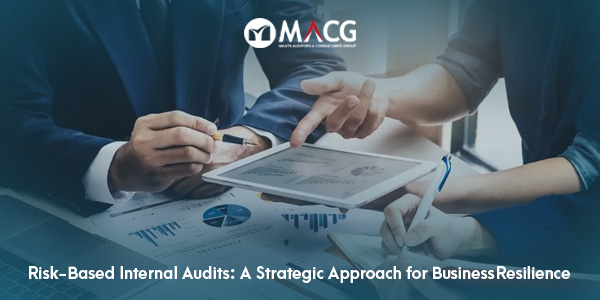Risk-Based Auditing
Traditional auditing has long focused on verifying financial accuracy and ensuring compliance. However, in today’s fast-paced and highly competitive business environment, companies need more than just a compliance check—they need proactive risk management to safeguard operations, financial stability, and strategic goals.
This is where Risk-Based Internal Audit (RBIA) comes in. Unlike conventional audits, RBIA shifts the focus from routine checks to strategically evaluating risks that could impact business performance. By aligning audit priorities with an organization’s unique risk profile, RBIA helps businesses anticipate threats, optimize controls, and enhance decision-making.
Why Choose a Risk-Based Internal Audit?
A risk-based approach prioritizes the most critical risks affecting business objectives. Instead of applying a one-size-fits-all audit process, RBIA targets high-risk areas, ensuring efficient resource allocation and deeper insights into operational vulnerabilities.
Key Benefits of RBIA:
✔ Strategic Focus – Aligns audits with business goals rather than just compliance.
✔ Proactive Risk Management – Identifies threats before they escalate.
✔ Operational Efficiency – Optimizes processes by addressing key weaknesses.
✔ Informed Decision-Making – Provides actionable insights for leadership.
By adopting RBIA, businesses can strengthen resilience, improve governance, and gain a competitive edge.
The Risk-Based Internal Audit Process
At Maats Auditors and Consultants, we follow a structured RBIA methodology to ensure comprehensive risk assessment and mitigation.
1. Understand Organizational Objectives
We begin by analyzing your strategic, operational, financial, and compliance goals to align audit priorities with business needs.
2. Identify Key Risks
Through management interviews, risk register reviews, and industry analysis, we pinpoint potential risks affecting your business.
3. Assess Risk Impact & Likelihood
We evaluate risks based on severity and probability, prioritizing high-impact areas requiring immediate attention.
4. Develop the Audit Universe
A structured audit framework is created, covering critical processes, departments, and systems exposed to risk.
5. Prioritize Audit Areas
High-risk zones are ranked, ensuring audit resources are allocated where they matter most.
6. Define Audit Scope & Objectives
Each audit is customized with clear objectives, key controls, and performance indicators for precise evaluation.
7. Prepare the Audit Plan
We design a tailored audit timeline, ensuring efficient execution and minimal business disruption.
8. Execute Risk-Based Audits
Using data analytics, control testing, and substantive procedures, we validate risk mitigation efforts.
9. Report Findings & Recommendations
Our reports provide clear, actionable insights to strengthen controls and improve business processes.
10. Monitor & Follow-Up
We ensure continuous risk tracking, reassessing controls and compliance measures for sustained improvement.
Advantages of Risk-Based Internal Auditing
Risk-based internal auditing offers significant advantages by prioritizing high-risk areas, which enhances efficiency and reduces time spent on low-impact audits. This targeted approach ensures that audit efforts are concentrated where they are needed most, leading to more meaningful insights and streamlined processes. Additionally, by focusing resources strategically, organizations can achieve greater cost-effectiveness, saving both time and money.
Beyond operational benefits, risk-based auditing also contributes to stronger governance by reinforcing internal controls and promoting greater accountability. It provides strategic value by aligning audit activities with organizational goals, supporting informed decision-making, and facilitating sustainable growth. This approach not only mitigates risk but also adds long-term value to the business.
In a rapidly evolving business environment like the UAE, risk-based auditing is no longer optional—it’s essential. At Maats Auditors and Consultants, we provide tailored RBIA solutions to help businesses:
✔ Identify and mitigate critical risks
✔ Enhance compliance and governance
✔ Optimize operational efficiency
✔ Improve financial and strategic decision-making
Whether you’re a startup, SME, or large corporation, our expert team delivers comprehensive auditing, risk management, and compliance strategies to safeguard your business.
Final Thoughts
A Risk-Based Internal Audit goes beyond traditional compliance checks, offering strategic insights and proactive risk management. By adopting RBIA, businesses can anticipate challenges, strengthen controls, and drive sustainable growth.
Maats Auditors and Consultants is your trusted partner for risk-based auditing in the UAE. Contact us today to enhance your audit approach and secure your business’s future.


